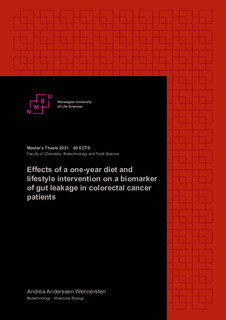| dc.description.abstract | Objective: The lipopolysaccharide-binding protein (LBP) has been proposed to be a biomarker of increased gut permeability. The main objective of this master thesis was to apply a mixed model approach to investigate whether a one-year diet and lifestyle intervention impacts the changes in plasma LBP levels in colorectal cancer (CRC) patients. The secondary objective was to investigate the associations between LBP and demographic and clinical characteristics.
Subjects and method: A total of 314 CRC patients, aged 50-80 years old, were randomized into an intervention group or a control group as part of a large intervention study (The CRC-NORDIET study) designed to test whether a diet in accordance with the Norwegian food-based dietary guidelines will impact survival and relapse. Only the intervention group received advice and incentives to change diet while both groups received advice regarding physical activity. Clinical data and symptoms were registered at the study center at baseline, after 6 months and 12 months and data was also collected from hospital records. Plasma LBP was measured by ELISA and statistics were performed using RStudio. In the mixed model, baseline BMI and LBP at baseline were added as covariates.
Results: Mixed model analysis revealed no significant difference between the groups with regards to change in plasma LBP concentrations after a 1-year dietary intervention. Large variations in the LBP concentrations were observed. A technical issue during sample collection was hypothesized to explain this large variation but was falsified in a test experiment. Impact of technical personnel was however found to affect the mixed model but did not affect the conclusion of no intervention effect. The majority of the selected variables did not correlate with neither LBP at baseline nor with the changes in LBP during the trial. However, significantly higher LBP concentrations were found at baseline for individuals that had experienced gastrointestinal pain (p=0.033) and fatigue (p=0.024) while lower LBP was associated with diarrhea (p=0.037). Furthermore, significant, but negligible correlations were found between BMI and LBP (p=0.013, rho=0.14), and between LBP and ‘time since operation’ (p=0.002, rho=0.18). Subjects on sick leave showed higher increase in LBP levels from baseline to 6 months compared to employed subjects (p=0.028), retired subjects (p=0.004), and subjects on disability benefits (p=0.004). Smokers had a significant decrease in LBP values from baseline to 12 months (p=0.013) compared to non-smokers. Finally, LBP in participants that had cerebral stroke hemorrhage during their lifetime decreased more from baseline to 6 months (p<0.05) and 12 months (p=0.021) compared with those that had never experienced this condition.
Conclusion: The results of the current thesis indicate that a dietary intervention over 12 months did not alter plasma LBP concentrations of CRC survivors. LBP may represent a biomarker for status of health due to the observed associations between LBP and various diseases and symptoms. Moreover, the results raise awareness on impact of technical personnel on variations in the laboratory test results, as well as the possible confounding effects of antibiotics. Further research is needed to elucidate the long-term effects of CRC-NORDIET study and investigate whether the associations found between the selected variables and LBP are of clinical importance. | en_US |

